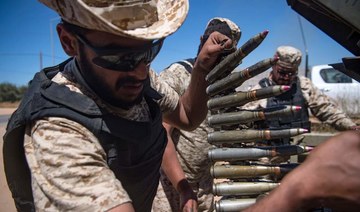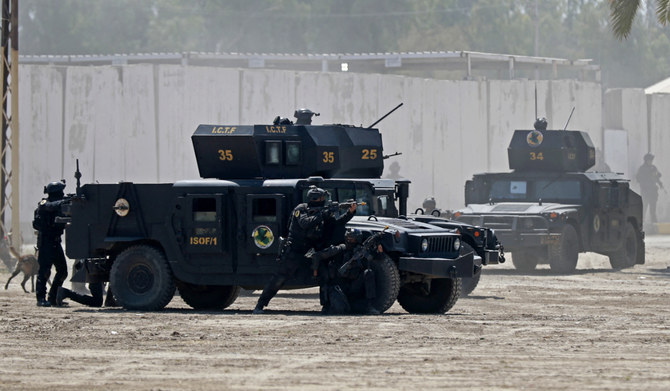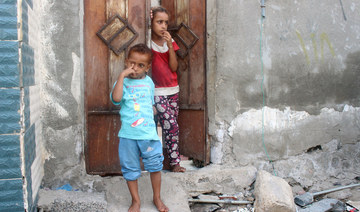BENGHAZI/GENEVA: Three people were killed on Thursday in a suspected hit-and-run attack by Daesh militants on a town in southern Libya, residents and a military official said, the second such attack within days.
Gunmen stormed the town of Ghadwa, opened fire before retreating back into the desert, residents said.
The attack came after nine soldiers were killed on Saturday in an attack claimed by Daesh on a training camp belonging to the eastern Libyan forces of commander Khalifa Haftar.
Haftar has concentrated his forces in the northwest, where they have been embroiled for the past month in a battle for the capital Tripoli with fighters allied to the divided country’s internationally recognized government.
Daesh is active in the south to where it retreated after losing its stronghold in the central city of Sirte in December 2016.
Separately, two boats carrying 214 migrants were intercepted by the Libyan coast guard late on Wednesday and taken back to the shore, the UN migration agency said.
“As clashes continue in the capital, we are concerned about the return and arbitrary detention of migrants in #Libya,” the International Organization for Migration said in a tweet.
IOM spokesman Joel Millman said the 107 people on the first boat included 12 women and 7 children, while the 107 people on the second boat were all men, 92 of them Sudanese, and there had been no reports of missing people or bodies retrieved.
On Wednesday, the independent AlarmPhone website, which provides a hotline for boat people in distress, said it was in touch with a boat with about 150 people on board, who were using their clothes to plug a hole and panicking.
The western Libyan coast is a major departure point for mainly African migrants fleeing conflict and poverty and trying to reach Italy across the Mediterranean Sea with the help of human traffickers.
Smuggling activity had slowed when forces loyal to military commander Khalifa Haftar launched an offensive to take the capital Tripoli, home to Libya’s internationally recognized government.
But human trafficking has picked up again since last week.
Three killed in suspected Daesh attack on southern Libya: official
Three killed in suspected Daesh attack on southern Libya: official
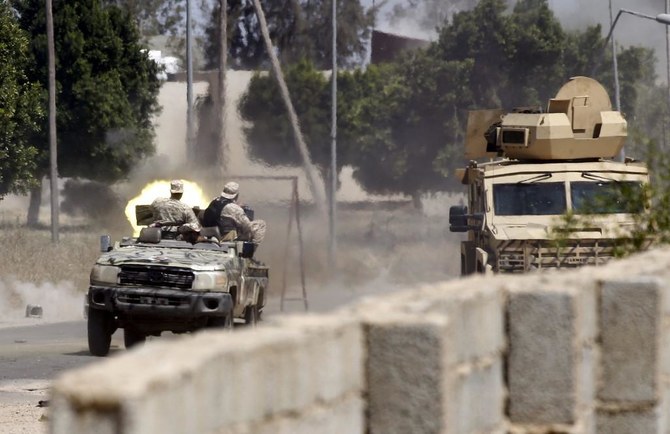
- Daesh are active in the south of Libya
- The militia claimed the attack on a training camp on Saturday which killed nine soldiers
Leaders of Jordan and Pakistan call UAE president to express concern about effects of severe storm

- Leaders passed on their best wishes to the country as it recovers from the storms
DUBAI: The president of the UAE, Sheikh Mohammed bin Zayed Al-Nahyan, received telephone calls from King Abdullah of Jordan and Pakistan’s Prime Minister Shehbaz Sharif on Friday, during which they expressed concern about the effects of the severe weather, including unusually heavy rainfall, that battered parts of the country this week.
They also passed on their best wishes to the country as it recovers from the storms and “conveyed their heartfelt hopes for the safety and prosperity of the UAE and its people, praying for their protection from any harm,” the Emirates News Agency reported.
Sheikh Mohammed thanked both leaders for their warm sentiments, and emphasized the strong bonds between the UAE and their nations.
The UAE and neighboring Oman were hit by unprecedented rainfall and flooding on Tuesday, with more than 250 millimeters of rain falling in parts of the Emirates, considerably more than is normally seen in a year. Dubai International Airport was forced to close temporarily when runways were flooded.
Peshmerga fighter dies in Turkish strike in north Iraq

JEDDAH: A member of the Kurdish Peshmerga security forces was killed on Friday in a Turkish drone strike in the autonomous Kurdistan region of northern Iraq.
Ankara regularly carries out ground and air operations in the region against positions of the outlawed PKK, the Kurdish separatist group that has waged a decades-long insurgency against the Turkish state.
The victim of Friday’s attack died in a drone strike on his vehicle, said Ihsan Chalabi, mayor of the mountainous Sidakan district near Iraq’s borders with Turkiye and Iran.
For decades, Turkiye has operated several dozen military bases in northern Iraq in its war against the PKK, which Ankara and its Western allies consider a terrorist group.
Both Baghdad and the Kurdish regional government have been accused of tolerating Turkiye’s military activities to preserve their close economic ties.
At the beginning of April, a man described as “high-ranking military official” from the PKK was killed in a Turkish drone strike on a car in the mountainous Sinjar region, according to the Kurdistan counterterrorism services.
Turkish President Recep Tayyip Erdogan is expected to visit Baghdad on Monday on his first official visit to Iraq since 2011.
Iraq’s Defense Minister Thabet Al-Abassi in March ruled out joint military operations against the PKK, but said that Turkiye and Iraq would “work to set up a joint intelligence coordination center.”
Middle East in ‘shadow of uncertainty due to regional conflicts’

WASHINGTON: Economies in the Middle East and North Africa face a “shadow of uncertainty” from ongoing tensions in the region, a senior IMF official said.
“We are in a context where the overall outlook is cast into shadows,” Jihad Azour, the International Monetary Fund’s director for the Middle East and Central Asia department, said in an interview in Washington.
“The shadow of uncertainty on the geopolitical side is an important one,” added Azour, a recent candidate for the next Lebanese president.
In the face of the ongoing conflicts in Gaza and Sudan and a recent cut to oil supplies by Gulf countries, the IMF has pared back its growth outlook for the Middle East and North Africa region once again.
FASTFACT
Economic activity in Gaza has ‘come to a standstill’ and the IMF estimates that economic output in the West Bank and Gaza contracted by six percent last year.
The IMF expects growth in MENA of 2.7 percent this year — 0.2 percentage points below its January forecast — before picking up again next year, the IMF said in its regional economic outlook report.
The risks to growth in the MENA region remain heightened, the IMF said, pointing to the danger of greater regional spillovers from the ongoing Israel-Gaza war.
“We have concerns about the immediate and lasting impact of conflict,” Azour said.
The IMF report said that economic activity in Gaza has “come to a standstill” and estimates that economic output in the West Bank and Gaza contracted by 6 percent last year.
The IMF said the report excludes economic projections for the West Bank and Gaza for the next five years “on account of the unusually high degree of uncertainty.”
The IMF cannot lend to the West Bank and Gaza because they are not IMF member countries.
However, Azour said it has provided the Palestinian Authority and the central bank with technical assistance during the current conflict.
“When we move into the reconstruction phase, we will be part of the international community support to the region,” he added.
Azour also discussed the situation in Sudan, where thousands have been killed in a civil war that has also devastated the economy, causing it to contract by almost 20 percent last year, according to the IMF.
“The country is barely functioning, institutions have been dismantled,” he said.
“And for an economy, for a country like Sudan, with all this potential, it’s important to stop the bleeding very quickly and move to a phase of reconstruction,” he added.
The recent Houthi attacks have particularly badly hit the Egyptian economy on Red Sea shipping, which caused trade through the Egypt-run Suez Canal to more than halve — depriving the country of a key source of foreign exchange.
Egypt reached an agreement last month to increase an existing IMF loan package from $3 billion to $8 billion after its central bank hiked interest rates and allowed the pound to plunge by nearly 40 percent.
A key pillar of the current IMF program is the privatization of Egypt’s state-owned enterprises, many of which are owned by or linked to the military.
“This is a priority for Egypt,” Azour said. Egypt needs to have a growing private sector and give space for the private sector to create more jobs.”
“We have an opportunity to re-engineer the state’s role, to give the state more responsibility as an enabler and less as a competitor,” he said.
Oxfam director urges global support for refugees in Jordan
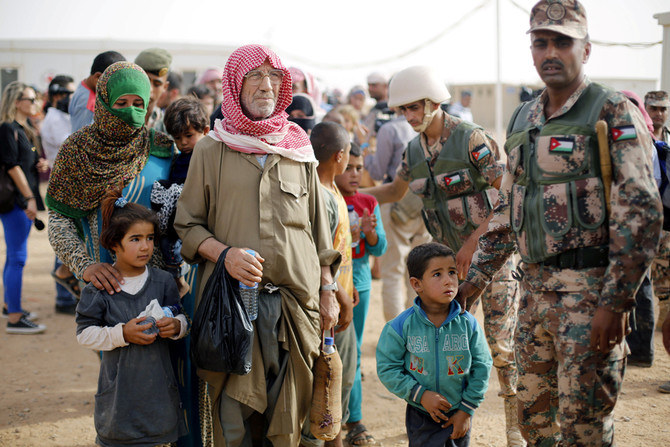
- Dmitry Medlev speaks of impact of over 3m people from neighboring areas
LONDON: Oxfam’s country director in Jordan said on Friday the global community had a responsibility to support refugees, especially in light of unrest in the Middle East.
In an interview with the Jordan News Agency, Dmitry Medlev described how an influx of over 3 million refugees from neighboring areas had stretched Jordan’s economic resources, disrupted local communities, and burdened public services.
He described the refugee’s experience as harrowing, often involving the painful process of abandoning the individual’s homeland and everything they held dear.
He said: “We are sending a message to the world not to overlook the refugee problem and to keep its focus on the new global disasters created by humans or caused by natural disasters, and the conflicts that have emerged in several countries recently, because the refugee problem is draining host countries and imposing additional burdens on them that they may not be able to bear in the future.”
Medlev called for enhanced international cooperation and adherence to international humanitarian law in supporting refugees, underscoring the need for long-term solutions to the ongoing crisis.
He also spoke of Oxfam’s initiatives in Jordan, such as the Waste to Positive Energy project in partnership with the Federal Ministry of Economic Cooperation and Development, and the EU, and executed with the German Corporation for International Cooperation. The project focuses on waste management and recycling in Zaatari Camp and Mafraq Governorate, processing about 30 tonnes of waste per day.
Medlev also pointed out Oxfam’s efforts in promoting economic and climate justice through grants aimed at empowering local projects led by women and youngsters. These grants help enhance project efficiency, ensure sustainability, and connect beneficiaries with supportive institutions.
He outlined Oxfam’s five-year strategy in Jordan, which focuses on gender justice, climate justice, and economic justice, and aims to bolster the country’s preparedness for disasters, enhance employment opportunities, and provide humanitarian support for refugees.
Jordan’s King Abdullah II told the UN General Assembly in September that the world must not abandon Palestinian refugees to the forces of despair.




